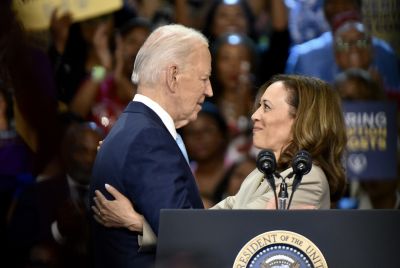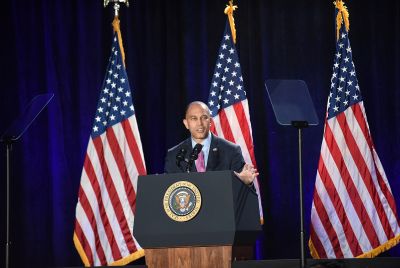UK will offer business 'sector deals' under Theresa May's new industrial strategy
The PM will make the announcement as she chairs her first regional cabinet meeting.
The UK government will offer businesses "sector deals" as part of a new industrial strategy, Prime Minister Theresa May will announce on Monday (23 January).
Britain's PM is expected to unveil the green paper as she chairs her first regional cabinet meeting with MPs in the north-west of England.
The plan is designed to help address sector-specific challenges and opportunities for companies.
"The modern industrial strategy will back Britain for the long term: creating the conditions where successful businesses can emerge and grow, and backing them to invest in the long-term future of our country," May will tell her top ministers.
"It will be underpinned by a new approach to government, not just stepping back but stepping up to a new, active role that backs business and ensures more people in all corners of the country share in the benefits of its success."
Number 10 also said the green paper outlines proposals to "strengthen institutions" across the UK, including helping to build up local trade bodies and/or making access to finance outside London easier for firms.
Carolyn Fairbairn, director-general of the Confederation of Business Industry (CBI), welcomed news of May's industrial strategy.
"It must help fix the country's productivity problems and remove the regional inequalities that have dogged our country for generations, having a positive impact on living standards, wages and the future opportunities of many people," she said.
"Our members across every region and nation of the UK will have a fundamental role to play to help shape the thinking and – most importantly – deliver the impact we all want to see."
The announcement will come a week after May's landmark speech to politicians and diplomats at Lancaster House, London.
The PM used the speech to unveil her 12-point Brexit plan, which included confirmation that the UK would not seek to maintain its membership of the EU's single-market.
But the Conservative premier also said she wanted to broker a "bespoke" customs agreement with the EU so that the UK can create its own trade deals, while goods could continue to move "frictionlessly" between Britain and the 27 EU nations.
Such tariff-free trade is a major concern for businesses in the UK and is expected to be major debating point of the Brexit negotiations. May plans to invoke Article 50 and trigger the divorce talks by the end of March 2017.
Labour leader Jeremy Corbyn has warned that May plans to turn the UK into a "bargain basement" tax haven.
"At every opportunity, the Conservatives have given handouts to the wealthiest and cut taxes for big business – while refusing to provide vital funds for the NHS, cutting social care and ditching rights at work," he said.
"Theresa May's vision for Brexit is now clear: a bargain basement Britain on the shores of Europe based on low pay and deregulation.
"[Last] week we heard the Prime Minister threaten to turn Britain into a tax haven, slashing corporate taxes and workers' rights in an all-out race to the bottom."
Theresa May's 12-point Brexit plan
- Government will provide certainty and clarity to politicians and businesses.
- UK will 'control our own laws' by quitting the European Court of Justice.
- May will strengthen the 'precious union' between England, Wales, Northern Ireland and Scotland.
- There will be no hard border between Northern Ireland and the Republic of Ireland.
- UK will 'control' EU immigration, while recruiting the 'brightest and the best' from around the world.
- Government will seek a reciprocal residency rights deal for EU and UK workers 'as soon as possible'.
- To protect workers' rights.
- Ministers will seek a 'bold' and 'comprehensive' free trade agreement with the EU.
- UK will seek a customs agreement so that it can broker its own trade deals with non-EU nations.
- May will keep European science and innovation ties in bid to keep the UK a 'world leader'.
- UK will continue to work with the EU in bid a bid to combat the threat of terrorism.
- Ministers will seek to avoid a 'cliff edge' and seek a smooth split from the EU.
© Copyright IBTimes 2025. All rights reserved.






















